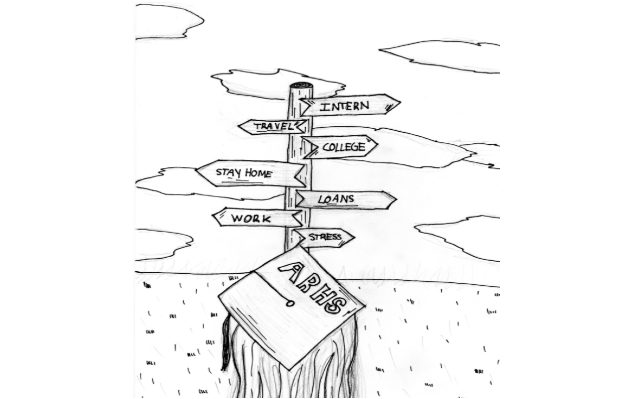College does not have to be universal experience
Assistant News Editor Catherine Hayden believes that college should not be viewed as the only option after high school.
June 1, 2018
With the competition at Algonquin, it’s not surprising that kids compare who got into which college, but with all the smart students, why do most not realize how counterproductive this behavior is to creating a balanced society?
College is not for everyone.
Not everyone should go to college.
If students are planning on becoming a plumber or electrician, they should not focus on college. According to The Institute for College Access & Success, attending college left Massachusetts graduates with an average of over $29,000 in debt in 2015. To avoid this, students who know their career does not require a degree should pursue an apprenticeship or a similar endeavor so they can start their career efficiently and effectively.
Society depends on construction workers, firefighters, plumbers, electricians, and other jobs that don’t necessarily require a degree, so the notion that everyone should go to college does not make sense. Everyone being highly educated in the traditional sense would be nice, but society still depends highly on people like firefighters to save lives. Sure, a highly educated doctor might have to help you with your burns afterward, but firefighters are a necessary step in the process.
For some people, joining the military is the best option for after graduation. Like firefighters, we need service members to protect civilians.
You might be thinking: what’s the big deal? The issue at Algonquin is that most people don’t seem to acknowledge the fact that college isn’t for everyone, and instead students and administrators alike create an environment where college seems like the necessary post-graduation step, through the activities such as college t-shirt day, where students wear merchandise from the college they will be attending the following fall. This environment creates a stigma around graduates not pursuing college.
According to John Murphy, a business manager of United Association Local, experienced plumbers can earn $200,000 a year if they are willing to put in the work for it. Those who do not attend college can earn a substantial living in their jobs. Therefore, college attendance is not indicative of whether a person will be financially successful or not, but either way, it’s important to remember that income does not determine personal success.
According to an article “The Skilled Labor Shortage Causes and Solutions” published by the New Hampshire Business Review, a reason for the current shortage in skilled laborers is the emphasis on going to college over pursuing a skilled labor job. If the stigma around not attending college after graduation were removed, the economy would improve since the labor shortage would be bettered.
It’s time for Algonquin students to accept that people do not need to take identical paths to achieve personal and financial success. It’s not enough to simply know that this is true, but rather to internalize it and change your behavior correspondingly. Don’t assume that everyone who is not going to college is stupid, or won’t be successful. Stop viewing yourself as better simply because you will be attending college. College is often viewed as a measure of how smart one is, but not going to college does not mean someone isn’t smart. Intelligence, like income, is not a measure of a person’s value or success. A person’s decision to attend college does not determine that person’s worth, so students must stop pretending that it does. Society needs highly educated doctors and lawyer, but it also needs firefighters and construction workers.










